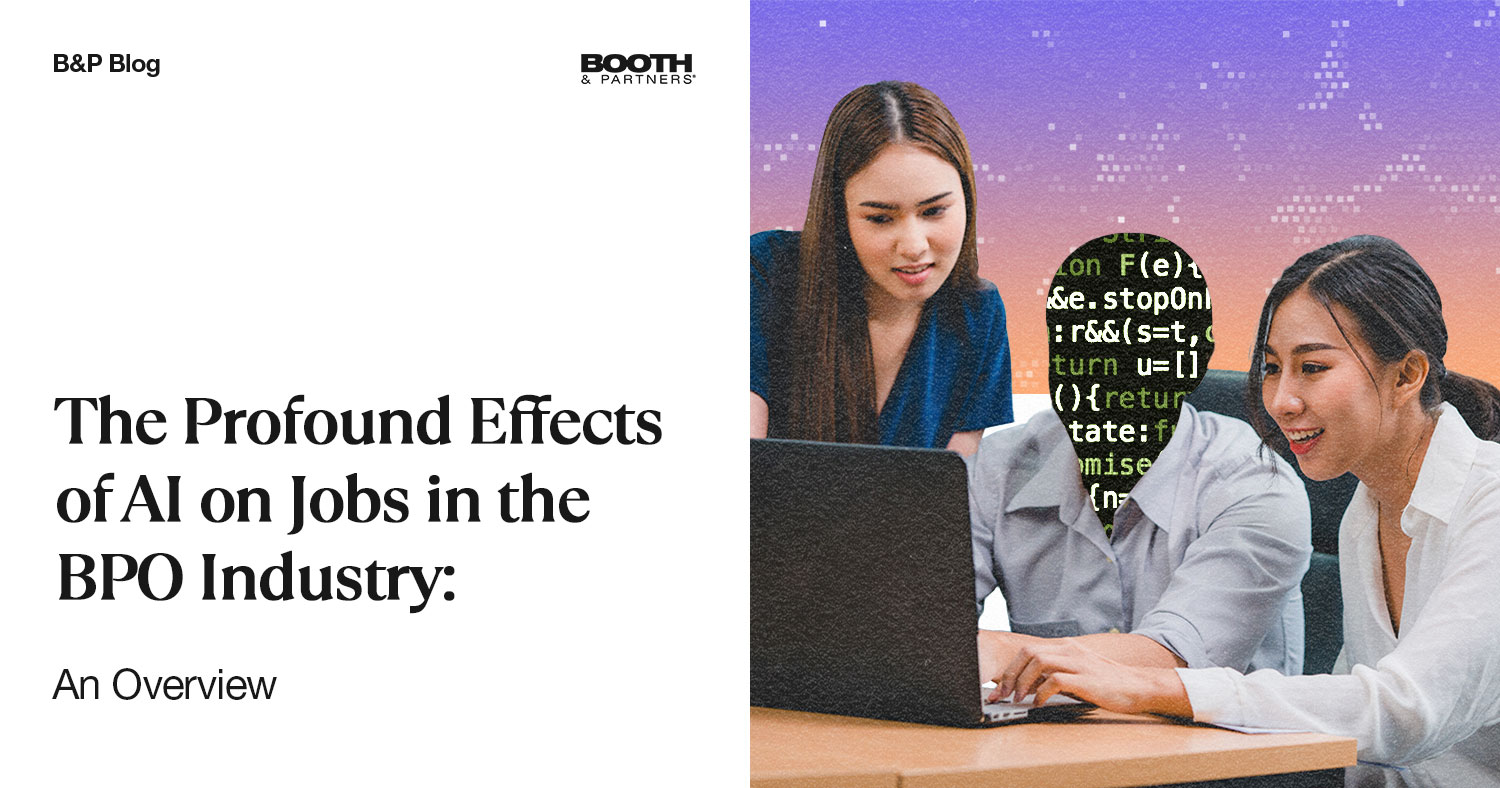The Profound Effects of AI on Jobs in the BPO Industry: An Overview

In a world where artificial intelligence (AI) has become an integral part of our daily lives, the effects of AI on different industries have been nothing short of profound. A recent report by Challenger, Gray & Christmas revealed that AI has already claimed its place in the workforce, contributing to nearly 4,000 job losses last month.
Furthermore, the report also unveiled a startling statistic: U.S.-based employers announced a record-breaking 80,000 layoffs in just one month—a 20% surge compared to the previous month and a shocking fourfold increase compared to the same time last year. Among these devastating figures, AI emerged as the seventh-highest contributor to this wave of unemployment, responsible for approximately 5% of the jobs lost.
Also, analysts predict that the AI industry, with its boundless potential, is destined to exceed the monumental milestone of $2 trillion by 2030. With major breakthroughs already apparent, such as the launch of OpenAI’s ChatGPT bot, the domino effect has been set in motion. The time has come for businesses to confront the transformative power of AI head-on.
In this blog post, we will uncover the multifaceted dimensions of artificial intelligence, analyze its impact on various job roles, and provide strategies on how to thrive in an evolving AI-driven workplace. Read on to learn more about how AI is reshaping the future of the BPO industry.
What is Artificial Intelligence? AI Explained in Simple Terms
Indeed, AI has emerged as a prominent buzzword recently. It has already started causing significant disruptions in various industries. But what exactly is it, and why are well-known companies investing in this groundbreaking technology? Let’s uncover the definition and concepts of AI and its technologies relevant to the BPO industry.
Definitions and Concepts of AI
Artificial Intelligence (AI) is the development of computer systems that can perform tasks requiring human intelligence. It involves creating intelligent machines that think, reason, and make decisions like humans. AI uses techniques like machine learning and natural language processing to analyze data, recognize patterns, and make predictions or recommendations.
Machine learning allows machines to learn from data without explicit programming. For example, ChatGPT, a form of AI, has been trained on a vast amount of text to understand and generate human-like responses.
Natural language processing enables machines to understand and interact with human language. ChatGPT uses NLP to comprehend the inputs it receives and generate coherent and contextually relevant responses.
AI is classified into Narrow AI and General AI. Narrow AI focuses on specific tasks and is widely used today. For instance, virtual assistants like Siri and Alexa are examples of Narrow AI that can answer questions and perform tasks based on voice commands.
General AI, on the other hand, represents machines that possess human-like intelligence across various domains. While General AI is still a goal for future development, it has the potential to revolutionize numerous industries and impact how we live and work.
Types of AI Technologies Relevant to the BPO Industry
In the Business Process Outsourcing (BPO) industry, AI technologies have been transforming operations, improving efficiency, and delivering enhanced customer experiences. Here are some examples of AI technologies that play a significant role in optimizing BPO processes:
1. Robotic Process Automation (RPA)
RPA utilizes software robots to automate repetitive, rule-based tasks, such as data entry, form processing, and invoice management. RPA streamlines workflow, reduces errors, and accelerates task completion, leading to increased productivity in BPO operations.
2. Natural Language Processing (NLP)
NLP enables machines to understand and interpret human language, including speech and text. BPO companies leverage NLP-powered chatbots and virtual assistants to handle customer queries, provide support, and assist in self-service interactions, enhancing customer service capabilities.
3. Machine Learning (ML)
ML algorithms enable systems to learn from data and improve performance over time. BPO organizations leverage ML to analyze vast amounts of data, identify patterns, and make predictions. This helps in fraud detection, risk assessment, customer segmentation, and personalized marketing campaigns.
4. Intelligent Document Processing (IDP)
IDP technologies use AI to extract relevant information from unstructured documents, such as invoices, contracts, and forms. This automation improves data accuracy, speeds up document processing, and enables efficient document management in BPO operations.
5. Cognitive Virtual Assistants (CVA)
CVAs are advanced AI systems capable of understanding context and engaging in meaningful conversations. BPO companies use CVAs to handle complex customer interactions, provide personalized recommendations, and deliver tailored solutions, resulting in improved customer satisfaction.
AI in the BPO Industry: Benefits and Drawbacks
AI in the BPO industry continues to gain momentum, with its potential to perform advanced organizational tasks and alleviate workloads. In this section, we will delve into the benefits of AI adoption in the BPO sector while also shedding light on the potential drawbacks it may bring to the workforce.
Advantages of AI Implementation in BPO Processes
AI implementation in BPO processes brings numerous benefits, revolutionizing the way operations are conducted. Below are some critical advantages observed across various industries:
Increased Efficiency and Productivity
Automating repetitive and rule-based tasks through AI technologies like Robotic Process Automation (RPA) reduces manual effort, accelerates task completion, and boosts overall operational efficiency. AI-powered chatbots and virtual assistants handle customer queries, providing prompt and accurate responses 24/7, resulting in faster query resolution and improved customer satisfaction.
Improved Accuracy and Quality
AI technologies, such as Intelligent Document Processing (IDP), enable accurate data extraction from unstructured documents, reducing errors and enhancing data quality. Machine Learning algorithms continuously learn from data, enabling BPO companies to make data-driven decisions, improve risk assessment, and enhance fraud detection.
Enhanced Customer Experience
Natural Language Processing (NLP) enables AI systems to understand and interpret human language, allowing for personalized customer interactions and tailored solutions. Cognitive Virtual Agents (CVAs) engage in meaningful conversations, providing efficient support, recommendations, and solutions, enhancing the overall customer experience.
Scalability and Cost Savings
AI technologies facilitate scalability, allowing BPO companies to handle increasing volumes of tasks and customer interactions without the need for significant human resource expansion. By automating repetitive tasks, BPO organizations can reduce costs, optimize resource allocation, and allocate human talent to complex and value-added tasks.
Potential Drawbacks and Challenges of Integrating AI
Integrating AI into BPO operations offers plenty of advantages, but it equally presents some potential drawbacks and challenges:
Initial Investment
Automating repetitive and rule-based tasks through AI technologies like Robotic Process Automation (RPA) reduces manual effort, accelerates task completion, and boosts overall operational efficiency. AI-powered chatbots and virtual assistants handle customer queries, providing prompt and accurate responses 24/7, resulting in faster query resolution and improved customer satisfaction.
Workforce Disruption
AI technologies, such as Intelligent Document Processing (IDP), enable accurate data extraction from unstructured documents, reducing errors and enhancing data quality. Machine Learning algorithms continuously learn from data, enabling BPO companies to make data-driven decisions, improve risk assessment, and enhance fraud detection.
Data Quality and Accessibility
AI algorithms rely on high-quality data. BPO organizations may face challenges in acquiring clean, relevant, and accessible data for training and deployment.
Ethical and Legal Considerations
AI raises ethical concerns around data privacy, security, and fairness. Ensuring compliance with regulations and addressing potential biases in AI algorithms are vital considerations.
Effects of AI on Job Roles in the BPO Industry
The rapid advancement of AI technology has profoundly impacted various industries, and the BPO industry is no exception. As AI continues to evolve, numerous job roles are susceptible to transformation or even elimination. Find out the list of job roles most affected by AI and the shifting job responsibilities and skill requirements in today’s AI-driven workplace.
Which Job Roles are Most Affected by AI
According to a comprehensive analysis, certain job roles are likely to experience massive disruption due to the implementation of AI technology. The analysis, which includes insights from both human-made models and ChatGPT-4 models, indicates that the following occupations are at high risk of AI disruption, with the potential to reduce task completion time by at least 50%:
- Accountants
- Admin and legal assistants
- Climate change policy analysts
- Reporters & journalists
- Mathematicians
- Tax preparers
- Financial analysts
- Writers & authors
- Web designers
- Blockchain engineers
Shift in Job Responsibilities and Skill Requirements
The integration of AI is reshaping job responsibilities and skill requirements across industries, leading to a substantial impact on the future of work. As AI technologies continue to advance, certain key changes are emerging:
Automation of Repetitive Tasks|
AI automates repetitive and mundane tasks, allowing employees to focus on more complex and value-added activities. This shift requires workers to adapt their skill sets to handle tasks that require creativity, critical thinking, and problem-solving.
Emphasis on Soft Skills
As AI takes over routine tasks, the demand for soft skills such as emotional intelligence, communication, collaboration, and adaptability is increasing. These skills enable individuals to work effectively with AI systems, understand customer needs, and provide personalized experiences.
Upskilling and Reskilling
The rise of AI necessitates upskilling and reskilling to ensure workers remain relevant in the changing job landscape. Employees must acquire new competencies, such as data analysis, AI system management, and programming, to leverage AI technologies effectively.
Human-AI Collaboration
The future of work involves a collaborative relationship between humans and AI systems. Workers will need to understand how to collaborate with AI technologies, interpret AI-generated insights, and make informed decisions based on AI recommendations.
New Job Roles and Opportunities
While AI may replace certain job functions, it also creates new job roles and opportunities. These include positions related to AI system development, data analysis, AI ethics, and managing AI implementation across organizations.
Effective Strategies on How to Adapt to AI-Related Changes in the Workplace
The effects of AI on the BPO sector prove the utmost importance of continuous learning in an ever-changing work landscape. If you’re a business owner, chances are your employees might fear the threat of job displacement. Don’t worry! There are ways to prepare your employees for the AI-powered future while preserving their well-being and job security. Below are some strategies that employees can adopt to navigate the AI era effectively and stay relevant in their industry:
1. Embracing Lifelong Learning:
- Employees should continuously update their knowledge of AI advancements and their implications in the workplace.
- Relevant training programs, courses, or certifications that enhance AI-related skills should be pursued.
- Cultivating a growth mindset and fostering a habit of lifelong learning enables employees to stay relevant and adaptable in a rapidly evolving landscape.
2. Understanding AI’s Role:
- Developing a fundamental understanding of AI and its applications within a specific industry or domain is crucial.
- Employees should recognize the potential impact of AI on their roles and identify areas where it can augment productivity and efficiency.
- Embracing AI systems and algorithms as collaborative tools that enhance their work, rather than viewing them as replacements, is essential.
3. Enhancing Critical Thinking and Problem-Solving Skills:
- Employees should focus on developing skills that complement AI capabilities, such as critical thinking, creativity, and complex problem-solving.
- Sharpening the ability to analyze data and extract meaningful insights supports informed decision-making processes.
- Seeking opportunities to engage in cross-functional projects that require human judgment and contextual understanding is beneficial.
4. Adapting to Changing Roles:
- Proactively assessing how roles may evolve due to AI implementation helps employees identify areas where they can provide unique value.
- Acquiring new skills or expanding existing ones to align with emerging AI-related job roles is recommended.
- Embracing flexibility and seizing the opportunity to redefine responsibilities to adapt to new team structures and workflows is crucial.
5. Collaborating and Communicating:
- Fostering a collaborative mindset and actively engaging with colleagues and AI systems enables employees to leverage collective intelligence.
- Communicating effectively with AI systems by providing clear instructions and constructive feedback is essential.
- Cultivating strong interpersonal skills allows employees to collaborate seamlessly with cross-functional teams comprising both humans and AI technologies.
Step Into the AI Era with Booth & Partners’ Cutting-Edge Managed Services Solutions
As leaders in the industry, we embrace AI technologies to enhance our service delivery. By leveraging AI, we optimize operational efficiency, streamline processes, and unlock new possibilities for your business. Trust Booth & Partners to navigate the AI era and propel your growth in today’s dynamic market.
Outsourcing your business functions to our team of experts allows you to tap into a pool of highly-skilled professionals. With our efficient performance management structure, we handle everything from end-to-end project management to operations, freeing you from the burdens of IT, office, people management, and labor relations costs.
Are you ready to experience the transformative power of outsourcing with Booth & Partners today? Click here to get a quote, or contact us for a quick discovery call.
Discover more about outsourcing and
how you can maximize it for your
business success!
Get a copy of our E-book: Guide to Outsourcing.




